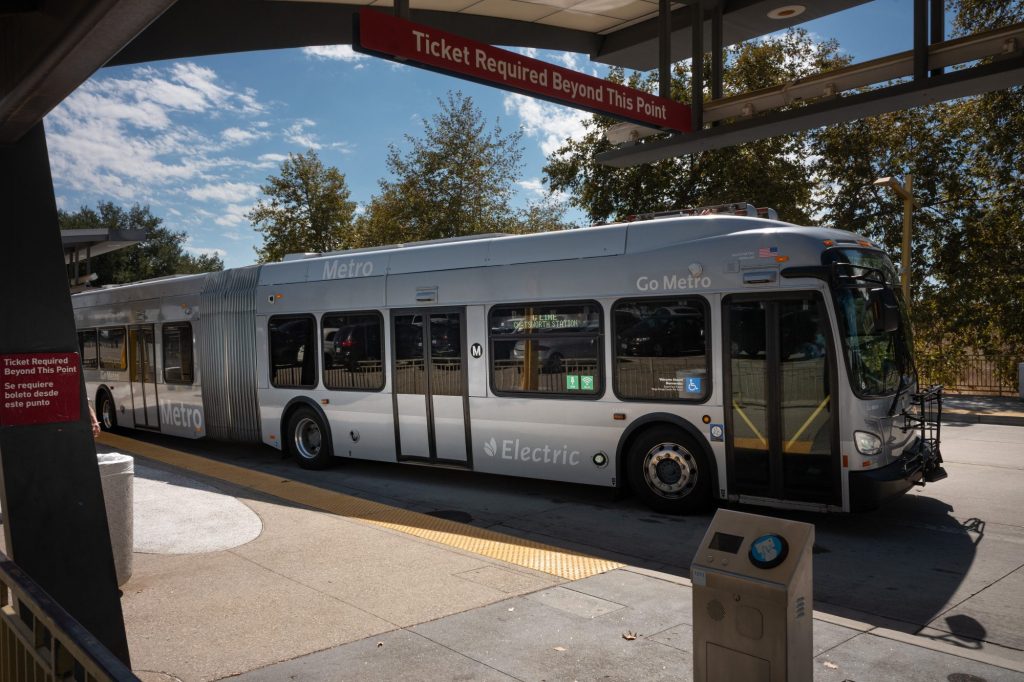Environment and labor groups say LA Metro is moving way too slowly to changeover its fleet of compressed natural gas buses to zero-emission electric-powered buses, saying their current rate is 3.5% and is an embarrassment.
The L.A. County Electric Truck and Bus Coalition is demanding the mega transit agency move more rapidly to electrify its fleet of about 2,050 buses, saying the agency should have at least 50% of its buses all-electric by the 2028 LA Olympic Games.
“If LA Metro continues its snail’s pace of fleet conversion, fleet electrification will take 250 years,” wrote the coalition. The coalition includes Earthjustice, Sierra Club, East Yard Communities for Environmental Justice, International Brotherhood of Electrical Workers Local 11, and Jobs to Move America.
Metro has made progress in some areas of Los Angeles County by replacing compressed natural gas buses with zero-emission electric buses.
The Metro G Line (Orange Line) in the San Fernando Valley has operated only with electric buses since late 2021. Metro runs 40, 60-foot articulated zero-emissions buses manufactured by New Flyer on the approximately 18-mile bus rapid transit line that runs between the North Hollywood B Line subway station and the Chatsworth Metrolink Station.
The transit agency has also begun swapping out old buses for new, electric ones on the J (Silver) Line between El Monte and the Harbor Gateway Transit Center. The J Line electrification should be completed by the end of this calendar year, according to a July Metro report on its Zero Emission Bus Program.
“LA Metro acknowledges the urgency of advancing toward a fully zero-emission bus fleet. While only a portion of Metro’s bus fleet are battery electric, the agency is actively moving forward with its comprehensive strategy to transition the entire fleet by 2035, making Metro one of the largest transit agencies in the nation to commit to this goal,” wrote Metro in response to the group’s claims.
But the group, headed by the environmental activist organization Earthjustice, said Metro needs to change out buses in heavily-used, low-income areas of Los Angeles and do so more quickly than planned. In 2017, the agency’s board voted to electrify 100% of its buses by 2030.
However, the agency cited market concerns and other factors affecting the pace of the fleet changeover. The agency has said it will reach 100% by 2035, not the 2030 deadline set by the board in 2017.
“Despite emergent nature of electric bus and charging technology, severe bus manufacturing market constraints, and high capital costs, Metro remains committed to its transition plan to achieve a zero-emission bus fleet by 2035,” the agency said in an emailed response.
Candice Youngblood, senior Earthjustice attorney leading the campaign, said Metro can do better.
“We are far off track from our goals. It can and should be more ambitious,” said Youngblood. She wants Metro to build out charging platforms at more bus depots serving riders in the City of Los Angeles, and at a quicker pace.
LA Metro, in a emailed response, said they are moving toward buying more electric buses and building the charging infrastructure. The agency has 95 battery electric buses, which represents 4.5% of the total fleet, it reported, with an additional 50 electric buses on order.
“Metro is constructing major charging and power facilities across divisions to support expansion, including on-site charging hubs at bus yards. Metro will fully electrify Division 9, its first depot electrification project, in 2026, and anticipates that Divisions 18 and 7 will be electrified in 2028,” the agency wrote.
Youngblood said if LA Metro doesn’t get to at least 50% electric buses by the time the Olympic Games arrive, they will be outdone by other host cities.
For example, Tokyo, Beijing and Paris, all recent Olympic host cities, had electrified 50% of their bus fleet when they held the games, she said. Also, Milan, set to host the 2026 Winter Olympics Games, has pledged to reach 50% by the start of the games in February.
“Not only are we far behind what Metro itself has committed to. Also, that is not keeping pace with other host cities,” Youngblood said. “We have only three years go get there so we have to take action today.”
“We can and should deploy more electric buses to move spectators and athletes,” wrote the coalition in a May letter to LA Metro.
Most LA Metro buses run on compressed natural gas. The emissions from these buses add to air pollution and smog, which contributes to breathing problems, heart problems, cancer and premature death, Youngblood said.
The emissions from these buses disproportionately affect low-income, at-risk communities. Residents in these communities are more likely to rely on bus transportation, since many do not own cars or live near train or subway stations, said Youngblood.
“Buses are so important because they are really the people’s vehicles,” Youngblood said. “They increase mobility for everyone, by helping kids get to school and the elderly to medical care. They have so much to gain from the health savings of electrifying the fleet.”
A fully electric bus system in L.A. County will eliminate 86% of harmful tailpipe emissions, according to a Metro September 2024 quarterly electric bus update. The document also said the public health benefit would be about $223 million between 2025 and 2050.
Metro says in the interim its buses are powered by renewable natural gas, which provides some air quality benefits. This fuel is made from decaying matter, such as agricultural waste and solid waste landfills, not from fossil fuel deposits.
Metro’s July quarterly zero-emission bus update said delivery of electric buses from BYD, “continue to struggle with adhering to delivery schedule,” adding that 13 buses were behind schedule, the report stated.
The coalition will hold a rally at 9 a.m. Thursday, Sept. 25 at Yaanga Park, near Metro headquarters. They will go into the Metro board meeting afterward and state their case.
Originally Published: September 24, 2025 at 5:14 PM PDT
